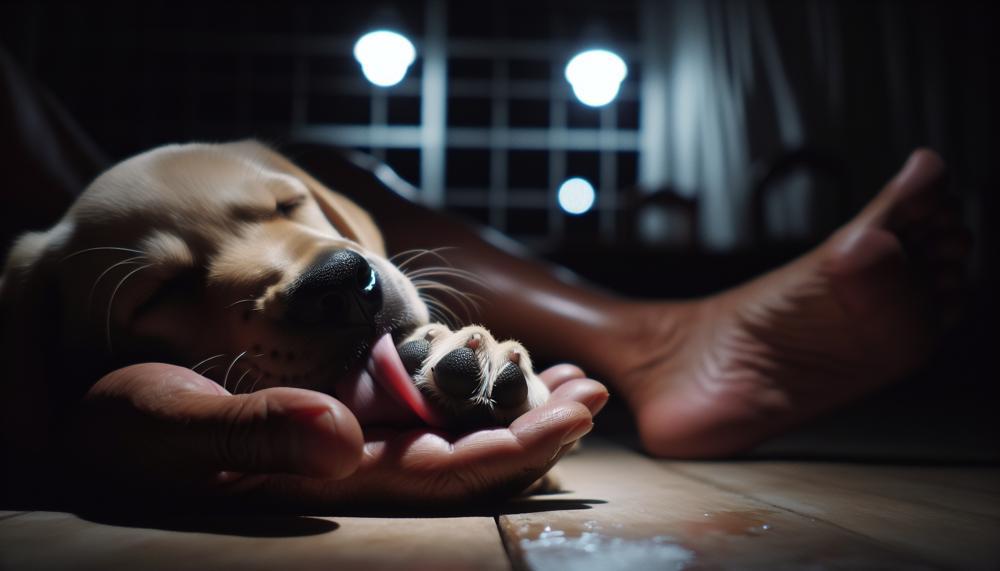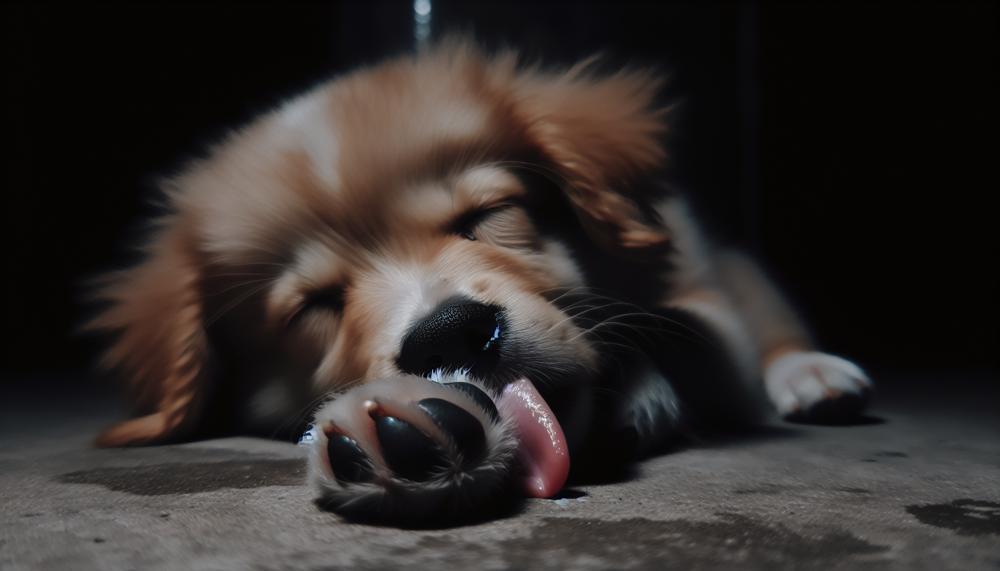Have you ever been startled awake by the sound of your dog obsessively licking their paws at night? Or perhaps you’ve woken up to find your furry companion with red and irritated paws from all the licking.
While it may seem like a harmless habit, nighttime paw licking in dogs can actually be a sign of underlying issues that require attention.
In this blog post, we’ll delve into the reasons behind this behavior and provide some helpful tips for managing it.
So, why does my dog lick his paws at night?
Dogs may lick their paws at night for a variety of reasons, including:
- Self-soothing: Dogs may lick their paws to self-soothe or groom themselves before bed.
- Relaxing: Anxious dogs may lick their paws at night to unwind from the day’s activities.
- Boredom, anxiety, or stress: These can cause obsessive paw licking.
- Allergies: Environmental allergies can cause itchy, inflamed skin, especially in the ears and on the paws.
- Infections: Infections caused by parasites, such as fleas or mites, can make your dog’s paws extremely itchy.
- Toenail injuries: If your dog has a broken toe or a very painful injury, they will lick that spot to help calm the pain.
- Wounds: If your dog has a wound, they will lick that spot to help keep it clean and make it heal quicker.
- Frostbite: Unprotected paws can pose problems in chilly weather, including frostbite, cuts and chapped skin, irritation from anti-ice products, and salt or grit getting stuck between their pads.
- Insect bites: An insect bite or a bite from another dog or animal can also cause your dog to lick his paws frequently.
- Splinters and other sharp objects: Splinters and other sharp objects can become embedded in the paw, leading to irritation and frustration.
Moderate licking before a dog falls asleep is considered normal, but anything excessive should be addressed with your vet.
So, grab your beloved four-legged friend and let’s embark on a journey to unravel the mysteries of nighttime paw licking.
Why Does My Dog Lick His Paws At Night?
Table of Contents
- 1 Why Does My Dog Lick His Paws At Night?
- 2 The Science Behind Licking Paws at Night
- 3 Identifying the Signs of Anxiety in Dogs
- 4 Allergies: A Common Cause of Paw Licking
- 5 Boredom and Its Effects on Dogs’ Behavior
- 6 Pain and Discomfort: A Possible Reason for Nighttime Paw Licking
- 7 Dryness and Hormonal Imbalance: Lesser-Known Factors to Consider
- 8 Conclusion
Dogs may lick their paws at night for a multitude of reasons, ranging from anxiety and allergies to boredom and underlying health issues. As a responsible pet owner, it is important to address this behavior, as it can lead to further complications and discomfort for your furry friend.
- Anxiety: Just like humans, dogs can experience anxiety due to various factors such as separation from their owners or cognitive dysfunction syndrome (CDS) in older dogs. Signs of anxiety in dogs may include excessive licking, pacing, and destructive behavior. To tackle this issue, it is crucial to identify the root cause of your dog’s anxiety and work with a veterinarian or animal behaviorist to develop an effective treatment plan.
- Allergies: Allergies can also be a reason behind your dog’s paw licking habit. The most common allergens for dogs are food, fleas, and environmental factors. If you suspect your dog has allergies, consult with your veterinarian to determine the specific allergen and develop an appropriate treatment plan. This may involve dietary changes, medication, or avoiding the allergen altogether.
- Boredom: Dogs may resort to excessive licking as a form of self-soothing behavior when they are bored. To address this issue, ensure that your dog gets enough physical and mental stimulation through regular exercise and interactive playtime.
- Foreign Bodies: Sometimes, objects stuck between the toes or insect bites can cause discomfort and irritation for dogs, leading them to lick their paws repeatedly. It is important to check your dog’s paws regularly for any foreign objects or signs of insect bites and remove them if possible.
- Pain: Injuries such as sprains and strains or joint problems like osteoarthritis can cause significant pain for dogs, making them lick their paws for relief. If you suspect your dog is in pain, consult with your veterinarian for proper diagnosis and treatment options.
- Dryness/Hormonal Imbalances: Dryness and hormonal imbalances can also contribute to paw licking in dogs. Ensure that your dog has access to clean water at all times and consult with your veterinarian if you suspect a hormonal imbalance.
- Underlying Health Issues: Excessive licking of surfaces (ELS) may be a symptom of an underlying gastrointestinal (GI) issue. It is crucial to consult with your veterinarian for proper diagnosis and treatment.
The Science Behind Licking Paws at Night
Licking paws is a common behavior among our canine companions, and it is especially prevalent at night. This seemingly simple act can actually reveal a lot about your dog’s emotional and physical well-being.
Here are some possible explanations for why dogs tend to lick their paws more frequently at night.
Self-Soothing Behavior

Dogs often use licking as a way to soothe themselves and find comfort.
The quietness of the night, with fewer distractions, can make licking a more appealing activity for dogs seeking relaxation.
Coping with Anxiety or Stress
Changes in their environment or loud noises can trigger anxiety or stress in dogs, leading them to excessively lick their paws at night.
This behavior serves as a coping mechanism, helping them release pent-up tension and calm their nerves.
Allergies and Skin Irritation
Skin allergies and irritations can cause discomfort for dogs, prompting them to lick their paws in an attempt to alleviate the itching and irritation.
However, this can lead to further skin damage and should be addressed by a veterinarian.
Dental Issues
Dogs may also turn to paw licking at night if they are experiencing dental issues, such as tooth pain or gum disease. This behavior serves as an attempt to self-soothe and alleviate the discomfort caused by dental problems.
Displays of Affection or Submission
Licking is a common way for dogs to show affection, submission, or establish hierarchical bonds within their pack. If your dog is excessively licking their paws at night, it may indicate a desire for affection from their owners or a need to assert dominance over other household pets.
Compulsive Disorders
In some cases, excessive licking at night may be a sign of compulsive behaviors, such as “lick granuloma,” where dogs obsessively lick a certain spot on their body due to stress or boredom.
Triggering Endorphin Release
Licking can also trigger the release of endorphins, natural chemicals that produce a sense of happiness and well-being in dogs.
This may be another reason why dogs tend to lick their paws more frequently at night, as it helps them feel safe and secure.
Identifying the Signs of Anxiety in Dogs
Identifying the signs of anxiety in dogs requires close attention to behavioral and physical changes. One subtle sign that may indicate underlying anxiety is paw licking at night. This behavior, along with others, should not be ignored as it can lead to more severe problems if left untreated.
Common Signs of Anxiety in Dogs:
| Behavioral Changes | Physical Symptoms |
| – Covering their eyes with paws | – Gastrointestinal issues |
| – Pacing and restlessness | – Excessive shedding |
| – Changes in sleeping patterns | |
| – Excessively panting | |
| – Destructive or vocal behaviors | |
| – Displacement behaviors (such as tail chasing and obsessive grooming) | |
| – Self-harming behaviors (in extreme cases) |
Paw licking at night may seem like a harmless behavior, but it can actually be a sign of underlying anxiety in dogs. This behavior may be a way for dogs to self-soothe and cope with their anxiety. It can also be a result of physical discomfort, such as allergies or injuries, that cause dogs to excessively lick and itch their paws.
However, it’s important to note that this behavior can lead to more serious problems if not addressed. Excessive licking can cause irritation and infections on their paws, creating a vicious cycle.
Therefore, it is crucial to identify and properly address the root cause of this behavior. Treatment for mild anxiety may include training techniques or calming aids, while moderate levels may benefit from desensitization and counter conditioning methods.
In severe cases, it is important to consult a veterinarian who may prescribe medication and refer the owner to a canine behaviorist.
Allergies: A Common Cause of Paw Licking
Paw licking is a common behavior in dogs, especially at night, and can be caused by allergies. Allergies cause discomfort and itchiness, which can lead to excessive licking as a coping mechanism. In this section, we will delve into the details of how allergies can contribute to excessive paw licking in dogs.
Allergies occur when the body’s immune system overreacts to certain substances, known as allergens. These allergens can be found in the environment, food, or even in a dog’s grooming products. When a dog comes into contact with an allergen, their body releases histamines, causing inflammation and itching.
| Allergen | Common Symptoms | Possible Treatment |
| Environmental Allergens (pollen, mold) | Itchy paws, redness, swelling | Antihistamines, hypoallergenic shampoo |
| Flea Bites | Itchy paws, redness, small bumps | Flea prevention and treatment |
| Pain or Injury | Limping, swelling, tenderness | Pain medication, wound care |
| Behavior Disorder/Anxiety | Compulsive licking, restlessness, pacing | Behavioral therapy, anti-anxiety medication |
During allergy season (typically spring and summer), environmental allergens like pollen and mold can cause dogs to develop itchy paws. This may result in excessive licking to alleviate the discomfort. In some cases, the allergens can trigger allergic reactions in dogs, leading to more severe symptoms.
Flea allergies are another common cause of excessive paw licking. Not only are fleas uncomfortable for dogs, but their bites can also trigger an allergic reaction in some dogs, known as flea allergy dermatitis. Dogs with this condition may excessively lick their paws, causing redness and swelling. Thus, it is crucial to regularly check and treat your dog for fleas to prevent this from happening.
Injuries or infections in a dog’s paws can also result in discomfort, leading to excessive licking. Dogs may lick their paws to clean and soothe the wound or injured area. It is vital to promptly address any injuries or infections and provide proper care to prevent further irritation and licking.
Lastly, allergies can also cause behavioral issues in dogs, resulting in excessive paw licking. Dogs may develop anxiety and stress due to their allergies, which can manifest in compulsive behaviors like licking. In these cases, addressing the underlying allergies and providing behavioral therapy or medication can help reduce the excessive licking.
In conclusion, allergies can be a common cause of excessive paw licking in dogs.
Boredom and Its Effects on Dogs’ Behavior
Boredom can have a major impact on a dog’s behavior, causing them to engage in destructive behaviors like excessive paw licking. When dogs are not properly stimulated, they may turn to this behavior as a way to alleviate their boredom.
However, it’s important to note that excessive paw licking can also be a sign of anxiety or stress, which can be caused by a lack of mental stimulation and physical exercise.
As responsible pet owners, it is crucial to provide our furry friends with enough mental and physical stimulation to prevent boredom and its negative effects on their behavior.
How boredom affects a dog’s behavior:
Dogs are social creatures that require mental and physical stimulation to stay happy and healthy. When they are deprived of these activities, they can become bored, leading to various behavioral issues such as destructive chewing, pacing, and excessive paw licking.
Furthermore, boredom can also cause dogs to experience anxiety and stress, which may manifest in repetitive behaviors like excessive paw licking.
The connection between boredom and excessive paw licking:
Excessive paw licking is often a sign of boredom in dogs. When they have nothing else to do, they may resort to this behavior as a way to entertain themselves.
This can also be a symptom of separation anxiety, as dogs may engage in this behavior when left alone for extended periods of time.
Preventing boredom in dogs:
To prevent boredom in dogs, it is essential for owners to provide their pets with enough mental and physical stimulation.
This can include daily walks, playtime, and interactive toys that challenge their minds. Additionally, rotating toys and introducing new ones regularly will help keep their interest and prevent boredom.
Seeking professional help for excessive paw licking:
If your dog continues to excessively lick their paws despite efforts to prevent boredom, it is important to seek professional help from a veterinarian or animal behaviorist.
They can rule out any underlying medical conditions and provide guidance on how to address the behavior.
In some cases, medication may be prescribed to help alleviate anxiety and stress in dogs.
Pain and Discomfort: A Possible Reason for Nighttime Paw Licking
Pain and discomfort may be a potential cause for your canine companion’s nighttime paw licking. Dogs are skilled at masking their pain, making it challenging to detect when something is wrong. Yet, persistently licking their paws is one way dogs may attempt to alleviate their pain or discomfort.
| Possible Cause | How it Affects Your Dog | How it Contributes to Nighttime Paw Licking |
|---|---|---|
| Allergies | Itchiness and Irritation in the Paws | Excessive Licking for Relief |
| Injuries | Pain and Discomfort | Licking Paws to Soothe the Pain |
| Arthritis | Joint Pain and Discomfort | Excessive Licking for Relief |
| Hormonal Imbalances | Overproduction of Thyroid Hormone Can Cause Itchiness and Discomfort | Compulsive Licking due to Discomfort and Itchiness |
So, pain and discomfort may be a cause for your dog’s nighttime paw licking. It is crucial to address any underlying issues and provide proper care to ensure your furry friend’s well-being.
Dryness and Hormonal Imbalance: Lesser-Known Factors to Consider
Dryness and hormonal imbalance are often overlooked as potential causes of excessive paw licking in dogs at night. These factors can cause irritation and discomfort in the paws, leading to increased licking as a way to soothe the area. To effectively reduce this behavior, it is crucial to address these underlying issues.
There are various reasons that may contribute to dryness and hormonal imbalance in dogs, including:
- Allergies: Just like humans, dogs can also suffer from allergies that can cause dry skin and irritation. This can result in excessive paw licking as a way to alleviate discomfort.
- Hormonal imbalances: Dogs with hormonal imbalances, such as hypothyroidism or Cushing’s disease, may experience dry skin and itchiness. This can also lead to excessive paw licking.
- Dehydration: Inadequate water intake can lead to dry skin and paws, causing discomfort and encouraging paw licking.
- Poor diet: A diet lacking in essential fatty acids and nutrients can contribute to dryness and hormonal imbalances in dogs, resulting in excessive paw licking.
Aside from addressing the underlying cause, there are some home remedies and treatments that can help alleviate dryness and hormonal imbalances in dogs:
- Proper grooming: Regularly brushing your dog’s coat can help distribute natural oils and keep their skin moisturized. Be sure to use a gentle shampoo specifically designed for dogs.
- Omega-3 fatty acids: Incorporating a fish oil supplement into your dog’s diet can improve skin health and reduce dryness.
- Moisturizing balms: There are moisturizing balms available specifically for dog paws that can soothe and protect dry, cracked skin.
- Veterinary care: If you suspect your dog has a hormonal imbalance, it is important to seek veterinary care for proper diagnosis and treatment.
By addressing dryness and hormonal imbalance in dogs, we can lessen discomfort and reduce the urge for excessive paw licking, resulting in a happier and healthier pup.
Conclusion
To sum up, dogs’ apparently harmless behavior of licking their paws at night might really be a warning sign for underlying issues that need your attention.
It’s important to pay attention to this behavior regardless of its cause—anxiety, allergies, boredom, or health problems. It is our responsibility as responsible pet owners to take care of this matter right away in order to save our furry friends from suffering more hardships.
We can give the right care to guarantee our dog’s general wellbeing by determining the underlying reason and getting assistance from a doctor or animal behaviorist. Therefore, don’t disregard your dog’s paw licking behavior the next time you hear it happening at night.
For their sake, never forget to be attentive and responsive.






